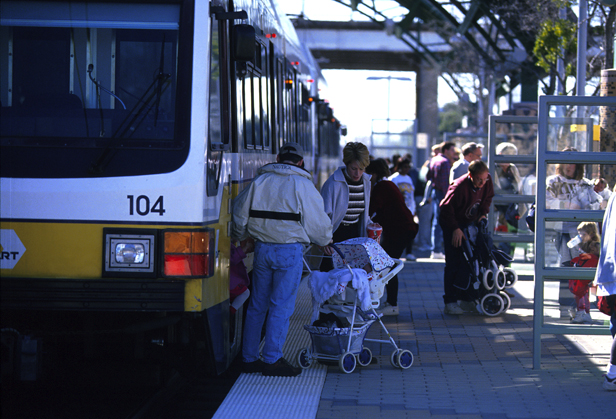Smarter transport relies on better communications both with travellers and between transport providers. Andrew Williams reports.
Inrix’s prediction that the cost of traffic congestion will rise by 63% to £21bn per year by 2030 clearly illustrates that, in addition to the ongoing inconvenience and inefficiency, ongoing gridlock is a significant drain on the economy. It is against this backdrop that a Cisco-led consortium has launched CitySpire, a smart transport programme that uses location-based services and data-analytics to reduce the flow of traffic and deliver demand-based public transport services across the Greater Manchester region.
Participants in the consortium include guest Wi-Fi specialist Purple, mobile payments company Proxama, crowd movement consultancy Movement Strategies, Transport for Greater Manchester and MaaS (Mobility as a Service) provider Simply Connect, an affiliated partner of the TravelSpirit Foundation.
As Marcus Starling, project lead at Cisco’s Collaborative Research and Emerging Technologies (CREATE) division says this will be achieved by combining location-based data from both Bluetooth Low Energy and Wi-Fi communication network. This will be used to create what he describes as a new demand responsive transport service, curated by Simply Connect, enabled by a networked approach to demand aggregation and end user engagement.
“Underpinning this, a new commercial model for private data exchange and analytics will be tested. The initiative aims to prove the value of an enhanced booking capability not currently available to existing popular ride sharing services, such as UberPool and BlaBlaCar,” he says.
As part of the 18 month project, which started on 1 June, an initial proof of concept will seek to generate insight from gathered data to inform other functions in Manchester. These range from planning departments and large event organisers to agencies charged with public safety and security.
TravelSpirit Foundation chair Si Ho argues that, until now, innovation in new mobility services such as flexible on-demand transport and bike sharing, has focused on engagement via customer apps and adopted a ‘centralised approach to matching supply with demand.’ However, CitySpire’s objective is to build a new infrastructure that enables groups of people with compatible journey requirements to identify themselves and form travel groups, before “booking appropriate transport services or making requests for better shared mobility service coverage in their area.
“This demand aggregation service is designed to tackle the problem that current ride-sharing services, despite meeting a consumer need and transport policy need, are struggling to establish sustainable market share of the transportation market. We see it as a key ingredient to the open Internet of Mobility,” says Ho.
Reduced travel time
In seeking to tackle what he calls the ‘real and ongoing problem’ of congestion for councils and cities across the UK, Starling reveals that CitySpire will also seek to ease the burden on public transport and help to reduce road congestion. Crucially, he claims that just a ‘modest ten minute travel time reduction’ for two-thirds of peak-time passenger journeys translates into ‘about £600-700 million of benefits in travel time savings’ across the UK each year. He also says the project hopes to influence a ‘shift away from private cars, leading to increased speed of flow, especially on routes currently not well-served by public transport’ such as orbital travel in Manchester.
“As a result, the platform will reduce travel time, providing a boost to economic productivity and encouraging better utilisation of the existing transport infrastructure - via increased vehicle occupancy, optimised routing and signalling - as well as improving accessibility across cities,” he says.
“Fundamentally, projects such as CitySpire also improve safety across cities, reducing crowding and directly impacting the risk of accidents, injuries and the associated trauma. In rail alone, the cost of injuries and traumatic incidents associated with overcrowding - including slips, trips and falls at the platform-train interface, as well as assaults and abuse - amounts to about £130 million per annum,” he adds.
In Ho’s view, society is currently in the process of transforming from the hierarchies of the industrial age to the peer meshes of the internet age. This will result in a ‘meshed society’ where citizens assume they will always be connected to the people and resources they need without their interactions being controlled by intermediaries. For him, such societies are ‘severely disruptive’ to traditional, hierarchical models based on leveraging control points.
“Business models and political movements have both faced challenges from self-organising groups of citizens and from new movements organising individuals into new ways of interacting. This trend even challenges business models of large technology giants like Amazon, Apple and Google, whose technology remains an architecture around centralised database control. The advantage of CitySpire is its focus on enabling decentralised behaviour,” he says.
“People know how best to form appropriate travel groups, assisted by location-based data and the ability to connect to each other. Platforms that enable this decentralised self-organising behaviour are better set-up to succeed in the meshed society,” he adds.
Neil Brown, Simply Connect project leader at TravelSpirit, agrees that the ability of demand responsive transport services to personalise public transport is a key benefit. In particular, this is because it facilitates a shift from the current ‘supply-driven’ focus of fixed-route scheduled services, to a ‘demand-driven’ approach with transport services responding to individual user needs and demands in real time.
“This permits users to enjoy an equivalent level of easy flexibility in managing their lives as the private car allows, yet without the many negative externalities of high levels of car use,” he says.
Does size matter?
Although confident of the benefits of projects like CitySpire, Brown still admits there are ‘many challenges’ to implementing such approaches. One potential hurdle is the fact that, although the rapid uptake of smartphones makes such ‘smart city’ initiatives feasible, the focus on such technology as the entry point for services risks creating a ‘new divide’. In contrast, he reveals that a key output of the CitySpire project will be a consideration of business models that ‘allow all to participate.’
“We also face a range of regulatory, fiscal, employment, vehicle specification and availability, technological, business model and business structural problems as well as gaining acceptance within the industry sector for the necessary attitudinal change of approach,” he says.
Ultimately, Brown expects that such services will have particular applicability where individual journey patterns are dispersed, meaning fixed route services like tram or bus corridors cannot be commercially justified, and where the great majority of travel is currently by private car. In his view, such diverse travel movements can only realistically be served by demand responsive services, and will always be complementary to high density movement corridors, where ‘bus corridors or trams will continue to be the most effective.’
“In broad terms, demand responsive services can best meet suburban, smaller town and, in metropolitan areas, orbital travel demands. Fixed route corridors, will continue to meet radial travel demands. Operating demand responsive services into major centres risks increasing, not reducing, traffic impacts,” he says.
Meanwhile, Ho argues that the CitySpire approach can function well at any scale, including rural areas and suburbs, where the need for self-organised travel groups is ‘arguably even more relevant compared to cities well-served by a backbone of frequent and reliable public transport. Greater Manchester, although well-served by public transport, has, like many cities of its scale, a focus on radial journeys to get people to and from the city core. This leaves many areas underserved, with solutions for ‘orbital’ journeys a particular political priority.
However, for Ho, a more relevant barrier to making such platforms work is determining how ‘open’ the transport system is to discovery and aggregation of services by third parties, a pre-requisite to mobility as a service and decentralised co-ordination of transport supply and demand. TravelSpirit has also developed an Index of Openness in Mobility as a Service - a practical tool to help create openness in developing MaaS projects.
“Projects such as CitySpire are an example of what becomes possible when we connect what we already know and provide a platform to enable it to be turned into actionable insight. At the moment a lot of data sits in silos - but these silos of information aren’t connected. When they are, almost like overlaying blueprints, it provides a better picture and can inform decisions,” he says.
“However, this is not just exclusive to large cities with established transportation networks and heavy traffic. To put it simply, it is not the size of the city, but any that see peak volumes of congestion at any time, whether it is a sporting event, concert or major gathering. It will be the cities that have the infrastructure and platform in place to support the peak performance times that will truly benefit,” he adds.
Manchester seeks smart but not selective transport solutions
Smarter transport relies on better communications both with travellers and between transport providers. Andrew Williams reports. Inrix’s prediction that the cost of traffic congestion will rise by 63% to £21bn per year by 2030 clearly illustrates that, in addition to the ongoing inconvenience and inefficiency, ongoing gridlock is a significant drain on the economy. It is against this backdrop that a Cisco-led consortium has launched CitySpire, a smart transport programme that uses location-based services a












